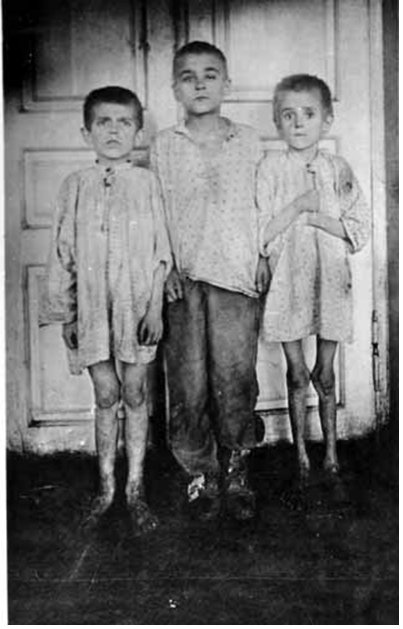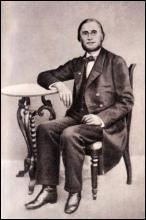|
Volodymyr Samiilenko
Volodymyr Ivanovych Samiilenko (; – 12 August 1925) was a Ukrainian poet, satirist, dramatist, and translator. Samiilenko was best noted as a satirist for his combination of poetry and political humour, and he was praised by intellectual leader Ivan Franko for his usage of lyricism. Born in modern-day Poltava Oblast to a serf and a landowner, Samiilenko was a polyglot, and began his career in literature and translation while studying in gymnasium. While a student at Saint Vladimir Imperial University of Kiev, Samiilenko became involved with several groups supporting the Ukrainian national revival. Although his works were barred from publication in the Russian Empire, they were frequently published in neighbouring Austria-Hungary, where they received critical acclaim. Samiilenko supported the Ukrainian People's Republic during the Ukrainian War of Independence and fled west to Poland after the Soviet advance, but returned to the country in the last year of his life. Early ... [...More Info...] [...Related Items...] OR: [Wikipedia] [Google] [Baidu] |
Velyki Sorochyntsi
Velyki Sorochyntsi (; formerly referred to simply as Sorochyntsi) is a village in Myrhorod Raion, Poltava Oblast, central Ukraine. It formerly had town status. It hosts the administration of Velyki Sorochyntsi rural hromada, one of the hromadas of Ukraine. The village is famous as the birthplace of the writer Nikolai Gogol () and the location of the Sorochyntsi Fair. In 1925–1931, the town was called Neronovychi after the Bolshevik activist Yevhen Neronovych, who was executed by Ukrainian military forces in the town in 1918. The population as of 2013 was estimated at 3,809, down from 4,231 in the 2001 census. The name of the village came either from the Slavic word ''soroka'' (magpie) or ''sorochka'' (shirt). There are many legends explaining the name of the village as the location of the Magpie's kingdom or of some magical shirt. History The earliest recorded mention of the settlement (sloboda) is in the 1620s. In 1646, the sloboda became the domain of a Polish Prince fr ... [...More Info...] [...Related Items...] OR: [Wikipedia] [Google] [Baidu] |
Lesya Ukrainka
Lesya Ukrainka (, ; born Larysa Petrivna Kosach, ; – ) was one of Ukrainian literature's foremost writers, best known for her poems and plays. She was also an active political, civil, and feminist activist. Among her best-known works are the collections of poems ''On the Wings of Songs'' (1893), ''Thoughts and Dreams'' (1899), ''Echos'' (1902), the epic poem ''Ancient Fairy Tale'' (1893), ''One Word'' (1903), plays ''Princess'' (1913), ''Cassandra'' (1903–1907), ''In the Catacombs'' (1905), and '' Forest Song'' (1911). Biography Lesya Ukrainka was born in 1871 in the town of Novohrad-Volynskyi (now Zviahel) of Ukraine. She was the second child of Ukrainian writer and publisher Olha Drahomanova-Kosach, better known under her pen-name Olena Pchilka. Ukrainka's father was Petro Kosach (from the Kosača noble family), head of the district assembly of conciliators, who came from the northern part of Chernihiv province. After completing high school in Chernihiv Gymnasium, ... [...More Info...] [...Related Items...] OR: [Wikipedia] [Google] [Baidu] |
Russian Revolution Of 1905
The Russian Revolution of 1905, also known as the First Russian Revolution, was a revolution in the Russian Empire which began on 22 January 1905 and led to the establishment of a constitutional monarchy under the Russian Constitution of 1906, the country's first. The revolution was characterized by mass political and social unrest including worker strikes, peasant revolts, and military mutinies directed against Tsar Nicholas II and the autocracy, who were forced to establish the State Duma legislative assembly and grant certain rights, though both were later undermined. In the years leading up to the revolution, impoverished peasants had become increasingly angered by repression from their landlords and the continuation of semi-feudal relations. Further discontent grew due to mounting Russian losses in the Russo-Japanese War, poor conditions for workers, and urban unemployment. On , known as " Bloody Sunday", a peaceful procession of workers was fired on by guards outside th ... [...More Info...] [...Related Items...] OR: [Wikipedia] [Google] [Baidu] |
Dnipro
Dnipro is Ukraine's fourth-largest city, with about one million inhabitants. It is located in the eastern part of Ukraine, southeast of the Ukrainian capital Kyiv on the Dnieper River, Dnipro River, from which it takes its name. Dnipro is the Capital (political), administrative centre of Dnipropetrovsk Oblast. It hosts the administration of Dnipro urban hromada. Dnipro has a population of Archeological evidence suggests the site of the present city was settled by Cossacks, Cossack communities from at least 1524. Yekaterinoslav ("glory of Catherine") was established by decree of the Emperor of all the Russias, Russian Empress Catherine the Great in 1787 as the administrative center of Novorossiya Governorate, Novorossiya. From the end of the 19th century, the town attracted foreign capital and an international, multi-ethnic workforce exploiting Kryvbas iron ore and Donbas coal. Renamed Dnipropetrovsk in 1926 after the Ukrainian Communist Party of the Soviet Union, Communist ... [...More Info...] [...Related Items...] OR: [Wikipedia] [Google] [Baidu] |
Kuban
Kuban ( Russian and Ukrainian: Кубань; ) is a historical and geographical region in the North Caucasus region of southern Russia surrounding the Kuban River, on the Black Sea between the Don Steppe, the Volga Delta and separated from the Crimean Peninsula to the west by the Kerch Strait. Krasnodar Krai is often referred to as ''Kuban'', both officially and unofficially, although the term is not exclusive to the krai and also accommodates the republics of Adygea, Karachay-Cherkessia, and parts of Stavropol Krai. Cossack settlement The Cossack settlement of Kuban and of the adjacent Black Sea region occurred gradually for over a century, and was heavily influenced by the outcomes of the conflicts between Russia and Ottoman Empire.Azarenkova et al., pp. 8ff. In the mid-18th century, the area was predominantly inhabited by the Adyghe tribes. After the Russo-Turkish War of 1768–1774, the population of the area started to show more pro-Russian tendencies. ... [...More Info...] [...Related Items...] OR: [Wikipedia] [Google] [Baidu] |
Zemstvo
A zemstvo (, , , ''zemstva'') was an institution of local government set up in consequence of the emancipation reform of 1861 of Imperial Russia by Emperor Alexander II of Russia. Nikolay Milyutin elaborated the idea of the zemstvo, and the first zemstvo laws went into effect in 1864. After the October Revolution of 1917 the zemstvo system was shut down by the Bolsheviks and replaced with a multilevel system of workers' and peasants' councils ("soviets"). History Zemstvos were created as part of the larger Great Reforms with the specific goal of creating organs of elected, local self-government. The existing system of local self-government in the Russian Empire was represented at the lowest level by the mir and at the regional level by the volost. These institutions continued during the zemstvo period; however, they were seen as insufficient, due to their lack of independent authority. In 1864, the first law on zemstvos was enacted by the Emperor, a law that outlined the p ... [...More Info...] [...Related Items...] OR: [Wikipedia] [Google] [Baidu] |
Chernihiv
Chernihiv (, ; , ) is a city and municipality in northern Ukraine, which serves as the administrative center of Chernihiv Oblast and Chernihiv Raion within the oblast. Chernihiv's population is The city was designated as a Hero City of Ukraine by the Ukrainian government during the Russian invasion of Ukraine. Names and etymology The name ''Chernihiv''/''Chernigov'' is a compound name, which begins with the Slavic root ''Cherni-''/''Cherno-'', which means 'black'. Scholars vary with interpretations of the second part of the name (''-hiv''/''-gov'', ) though scholars such as Dr. Martin Dimnik, Professor of Medieval History at University of Toronto, connect Chernihov with the worship of "the black god" Chernibog. The city of Chernihiv is also historically known by different names in other languages – ; . History Early history Chernihiv was first mentioned (as ) in the Rus'–Byzantine Treaty (907), but the time of its establishment is unknown. Artifacts from the Khazar Khaga ... [...More Info...] [...Related Items...] OR: [Wikipedia] [Google] [Baidu] |
Vernadsky National Library Of Ukraine
The Vladimir Vernadsky, Vernadsky National Library of Ukraine, VNLU () is the main academic library and main scientific information centre in Ukraine, one of the List of largest libraries, world's largest national library, national libraries. Its main building is located in the capital of the country—Kyiv, in the Demiivka neighborhood. The library contains about 15 million items. The library has the most complete collection of Old Church Slavonic, Slavic writing, archives of outstanding world and Ukrainian scientists and cultural persons. The holdings include the collection of the presidents of Ukraine, archive copies of Ukrainian printed documents from 1917, and the archives of the National Academy of Sciences of Ukraine. History The Vernadsky National Library of Ukraine was established on 2 August 1918 by Hetman Pavlo Skoropadskyi as the "National Library of the Ukrainian State" (''Natsionalna biblioteka Ukrayinskoyi Derzhavy''). On 23 August 1918 the Provisional Comm ... [...More Info...] [...Related Items...] OR: [Wikipedia] [Google] [Baidu] |
Mykhailo Kotsiubynsky
Mykhailo Mykhailovych Kotsiubynsky (; 17 September 1864 – 25 April 1913) was a Ukrainian author whose writings described typical Ukrainian life at the start of the 20th century. Kotsiubynsky's early stories were described as examples of an ethnographic realism; in the years to come, with his style of writing becoming more and more sophisticated, he evolved into one of the most talented Ukrainian impressionist and modernist writers. The popularity of his novels later led to some of them being made into Soviet movies. Life Kotsiubynsky grew up in Bar, Vinnytsia region and several other towns and villages in Podolia, where his father worked as a civil servant. He attended the Sharhorod Religious Boarding School from 1876 until 1880 and continued his studies at the Kamianets-Podilskyi Theological Seminary, but in 1882 he was expelled from the school for his political activities within the populist movement. Influenced by the awakening Ukrainian national idea, Kotsiubyns ... [...More Info...] [...Related Items...] OR: [Wikipedia] [Google] [Baidu] |
Borys Hrinchenko
Borys Dmytrovych Hrinchenko (, ; December 9, 1863 – May 6, 1910) was a classical Ukrainian prose writer, political activist, historian, publicist, and ethnographer. He was instrumental in the Ukrainian cultural revival of the late 19th and beginning of the 20th centuries. Author of the first dictionary of the Ukrainian language together with his wife, Maria Hrinchenko, and editor of a number of Ukrainian periodicals, he advocated the spread of the Ukrainian language in schools and institutions. Hrinchenko was an editor of various Ukrainian periodicals. He was one of the founders of the Ukrainian Democratic Party. Hrinchenko also was an author of seminal ethnographic, lexicographic, and pedagogical works, literary studies, historical reviews, the first textbooks in the Ukrainian language, particularly ''Native word'', the school-book for reading. He was an editor of the four-volume ''Словарь української мови'' (Ukrainian Dictionary; " Kievskaia starina" ... [...More Info...] [...Related Items...] OR: [Wikipedia] [Google] [Baidu] |
Leonid Hlibov
Leonid Ivanovych Hlibov ( ; 5 March 1827 – 10 November 1893) was a Ukrainian poet, writer, teacher, and civic figure. Life Hlibov was born in Veselyi Podil, Khorol county, Poltava gubernia. He graduated from the Nizhyn Lyceum in 1855. In 1858 he began to teach at the gymnasia in Chornyi Ostriv and Chernihiv. He was active in the Chernihiv Hromada, published educational books, and contributed to the Saint Petersburg Ukrainian journal ''Osnova''. In 1861 he founded and became editor of the weekly newspaper ''Chernigovskii listok'', in which he published some of his works. In 1863 the Russian authorities closed down the paper and banned his works. Hlibov was then fired from his teaching job and was forced to live under police surveillance. From 1867 to his death he was the director of the Chernihiv zemstvo printing house. He died in Chernihiv. Works Hlibov wrote over 40 romantic lyric poems in the Ukrainian language. His poem 'Zhurba' (Sorrow), was used by Mykola Lysenko and ... [...More Info...] [...Related Items...] OR: [Wikipedia] [Google] [Baidu] |





